The demand for fruit snacks in the USA is projected to grow from USD 2.4 billion in 2025 to USD 4.7 billion by 2035, reflecting a CAGR of 7%. Fruit snacks, which include products such as dried fruit, fruit chips, and fruit bars, have become increasingly popular due to rising consumer demand for healthier snack options. With growing awareness of the benefits of plant-based and natural foods, fruit snacks are seen as a nutritious alternative to traditional snacks like chips and candy. The increase in health-conscious eating habits and the rising preference for convenient, on-the-go snacks are expected to contribute significantly to the market's expansion.
The market is also benefiting from trends such as the growing popularity of clean-label foods, which do not contain artificial ingredients, preservatives, or additives. As consumers prioritize natural, low-calorie snacks, fruit snacks are well-positioned to meet these demands. The market will also be influenced by increasing fruit snack offerings in retail and online platforms, providing more access and convenience for consumers. Additionally, the expansion of organic and functional fruit snacks will help drive future growth, further reinforcing their position in the snack food industry.
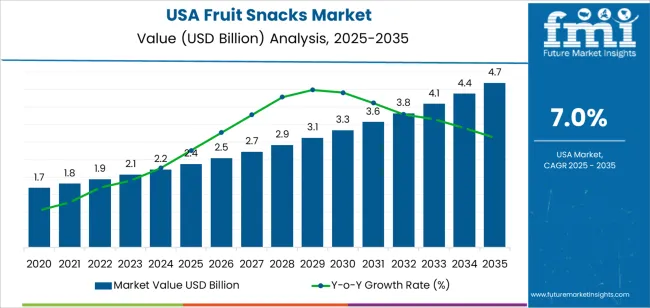
The market growth curve for fruit snacks in the USA shows a steady upward trajectory over the forecast period, with a smooth and consistent acceleration in demand. From 2025 to 2030, the market will grow from USD 2.4 billion to USD 3.3 billion, contributing USD 0.9 billion in value. This early phase will be marked by an initial acceleration as increasing consumer demand for healthier snack options drives growth. The rise of plant-based snacks, convenient packaging, and natural fruit-based ingredients will lead to an increased consumer base. This phase will also see wider retail availability and more brands entering the market, contributing to stronger growth.
From 2030 to 2035, the market will expand from USD 3.3 billion to USD 4.7 billion, adding USD 1.4 billion in value. This phase will likely show more stable but robust growth, as fruit snacks become mainstream in the snack food industry. The maturation of the market will be driven by increasing brand loyalty, the expansion of organic offerings, and the growth of functional snacks that provide additional health benefits. The growth curve in this phase will reflect a gradual deceleration in acceleration, as the market approaches saturation, but demand will continue to rise steadily due to increasing consumer preference for healthy, convenient snacks and the rising trend of functional foods. Overall, the market is expected to experience a consistent and healthy growth pattern throughout the forecast period.
| Metric | Value |
|---|---|
| Industry Sales Value (2025) | USD 2.4 billion |
| Industry Forecast Value (2035) | USD 4.7 billion |
| Industry Forecast CAGR (2025-2035) | 7% |
Demand for fruit snacks in the USA is growing as consumers increasingly prefer convenient and healthier snacking options. In recent years, the USA fruit snacks market generated approximately USD 4,084.1 million in revenue. Projections indicate this could reach about USD 6,713.7 million by 2030, which corresponds to a compound annual growth rate (CAGR) near 6.4%. Products such as freeze-dried fruits, fruit bars, and soft chews are popular because they offer portability, better nutritional profiles compared to many traditional snacks, and appeal to on-the-go lifestyles and health-conscious consumers.
Another significant driver is the elevation of consumer expectations around clean-label ingredients, natural colors, low sugar content, and functional additives like fiber or vitamins. Retail and online channels are expanding their shelf space and assortments for fruit-based snacks, responding to demand from younger demographics and families looking for better alternatives. The convenience of single-serve packaging and strong presence in school, travel, and workplace environments further supports uptake. Challenges include competition from other snack formats and price sensitivity among certain consumer segments. Nonetheless, the growing emphasis on healthier snacking and longer shelf-life formats suggests demand for fruit snacks in the USA will continue to rise steadily.
The demand for fruit snacks in the USA is primarily driven by product type and product claim. The leading product type is dried fruits, capturing 34% of the market share, while organic is the dominant product claim, accounting for 34.2% of the demand. Fruit snacks, including dried fruits, fruit chips, and fruit-based snack bars, are becoming increasingly popular due to their convenience, health benefits, and versatility. As consumer interest in healthier, plant-based snack options rises, the demand for fruit snacks continues to grow, particularly those that emphasize organic and non-GMO ingredients.
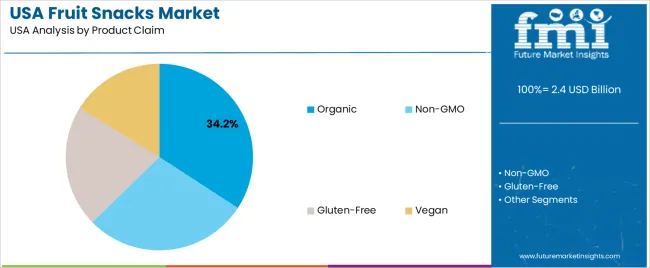
Dried fruits lead the market for fruit snacks in the USA, accounting for 34% of the demand. Dried fruits, such as raisins, apricots, and mangoes, offer a portable, convenient, and nutritious snack option. These snacks retain much of the flavor, vitamins, and minerals of fresh fruit, making them a popular choice among health-conscious consumers. Dried fruits are often seen as a healthy alternative to candy and other processed snacks, providing a natural source of fiber and antioxidants.
The growing demand for dried fruits is fueled by their versatility and appeal in a wide range of consumer segments, from children to adults. Additionally, as consumers increasingly look for snacks that align with their health and wellness goals, dried fruits remain a go-to choice due to their relatively low calorie content and high nutritional value. With the continued focus on healthy eating and snacking habits, the demand for dried fruits in the fruit snack market is expected to remain strong.
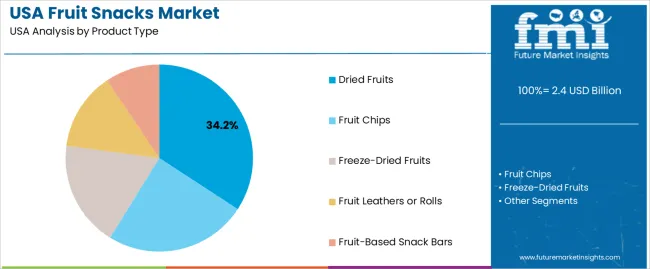
Organic is the leading product claim in the fruit snack market in the USA, capturing 34.2% of the demand. The growing preference for organic products is driven by increasing consumer awareness about the health and environmental benefits of organic farming. Organic fruit snacks are perceived as cleaner and safer, as they are free from synthetic pesticides, fertilizers, and genetically modified organisms (GMOs). This aligns with the broader trend toward natural, unprocessed foods.
As consumers continue to prioritize sustainability and healthy eating, organic fruit snacks are becoming more desirable. The appeal of organic fruit snacks is especially strong among parents looking for healthier snack options for their children and among health-conscious adults. Additionally, the growth of organic certifications and the availability of organic fruit snacks in mainstream supermarkets have made these products more accessible to a broader audience. As the organic food market continues to expand, the demand for organic fruit snacks will likely remain a key driver in the overall fruit snack sector.
Demand for fruit snacks in the USA is supported by strong consumer interest in convenient, better-for-you snack options as busy lifestyles and wellness-focused eating habits continue to rise. As families and younger consumers seek snacks that combine taste with perceived health benefits, fruit-based snack formats stand out. At the same time, challenges such as competitive pressure from traditional snacks, sugar content concerns and raw-material cost volatility influence product innovation and pricing strategies. These factors together shape the evolving demand for fruit snacks.
What Are the Primary Growth Drivers for Fruit Snack Demand in the United States?
Several growth drivers are especially influential. First, improved health consciousness among USA consumers is encouraging choice of snacks with real fruit ingredients, low artificial additives and cleaner ingredient lists. Second, the rise of on-the-go consumption and snacking occasions during commuting, work breaks, after-school or travel supports formats that are portable and ready to eat. Third, innovation in product types, such as organic fruit snacks, fruit bars, dried fruit crisps and functional variants with added vitamins or fibre, continues to expand category appeal. Fourth, distribution expansion through e-commerce, convenience stores and new retail channels is increasing access and visibility of fruit-snack products across consumer segments.
What Are the Key Restraints Affecting Fruit Snack Demand in the United States?
Despite favourable growth conditions, several restraints temper demand. First, sugar content and nutritional profiling concerns may reduce consumer confidence in some fruit snacks, particularly when positioned as health-oriented. Second, competition from traditional snacks, such as chips, candies and cookies, with lower price points and high brand loyalty may limit fruit-snack market share. Third, cost pressures, especially for organic ingredients, clean-label certification and sustainable packaging, may raise product costs and affect consumer adoption in more price-sensitive segments. Fourth, raw-material supply instability, seasonal fruit pricing fluctuations and processing costs introduce risk for manufacturers.
What Are the Key Trends Shaping Fruit Snack Demand in the United States?
Important trends include growing segmentation toward high-value formats, such as organic, non-GMO, gluten-free and functional fruit snacks with added benefits, which appeal to premium-seeking consumers. Another trend is flavor innovation, including exotic fruits, blends and better-tasting healthy alternatives, to capture both adult and younger demographics. Third, packaging innovations and e-commerce friendly formats, such as single-serve pouches and resealable bags, support convenience and snacking frequency. Fourth, sustainability and transparency are increasingly important, with more brands emphasising clean-label ingredients, recyclable packaging and sourcing claims to meet consumer expectations in the snack category.
The demand for fruit snacks in the USA is increasing as consumers are increasingly seeking healthier, convenient snack options. Fruit snacks, known for their portability and nutritional value, cater to a growing preference for clean-label products and healthy snacks that are both enjoyable and good for overall health. Factors such as a shift towards healthier lifestyles, increasing awareness about the benefits of fruits, and busy consumer lifestyles are contributing to the market’s growth. The rise in demand for plant-based and natural ingredients, especially among younger demographics, is driving fruit snack popularity. Regional demand is influenced by factors such as population density, health trends, and access to healthy food options. Below is a breakdown of the demand for fruit snacks across different regions of the USA.
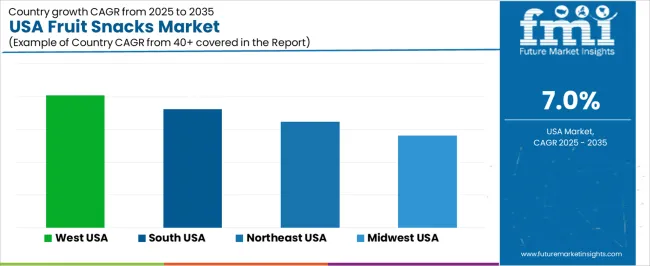
| Region | CAGR (2025-2035) |
|---|---|
| West | 8.1% |
| South | 7.2% |
| Northeast | 6.5% |
| Midwest | 5.6% |
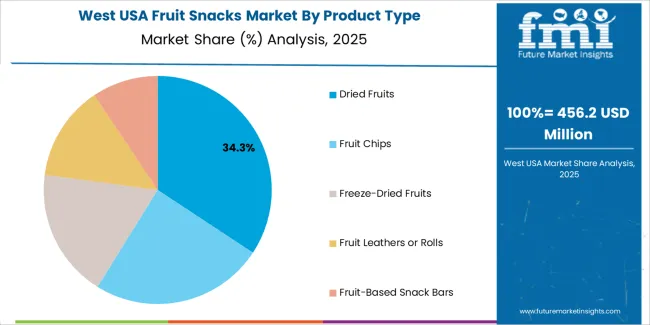
The West leads the demand for fruit snacks in the USA with a CAGR of 8.1%. The region’s focus on health and wellness, particularly in states like California, contributes to the increasing adoption of healthier snack options, including fruit snacks. The West is home to a large, health-conscious population that is keen on finding convenient, nutritious snack alternatives. With busy lifestyles and an increasing trend towards plant-based and organic foods, fruit snacks are gaining popularity as a quick, healthy snack option.
Additionally, the West has a strong presence of natural food brands, retail chains, and e-commerce platforms that make fruit snacks widely available. The growing awareness of the nutritional benefits of fruit snacks and their ability to cater to dietary preferences like vegan and gluten-free further boosts demand in this region. As consumer demand for healthy, convenient snacks continues to rise, the West remains the largest market for fruit snacks in the USA.
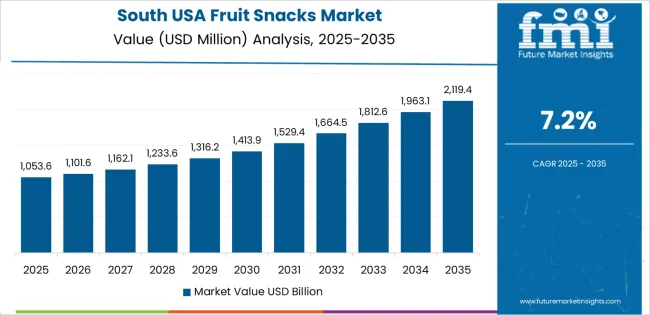
The South shows strong demand for fruit snacks with a CAGR of 7.2%. The region’s diverse population and growing focus on healthier eating habits contribute to the increasing popularity of fruit snacks. States like Texas, Florida, and Georgia have large populations, with many consumers shifting towards natural, fruit-based snacks as alternatives to traditional, high-sugar processed snacks.
The South’s warmer climate, which makes fresh fruit more desirable, also supports the growing preference for fruit snacks as a convenient, on-the-go option. Additionally, increasing awareness of the health benefits of fruits, combined with the rise of natural and clean-label products, is fueling market growth. As more consumers seek healthier snack alternatives for both adults and children, the demand for fruit snacks will continue to grow steadily in the South.
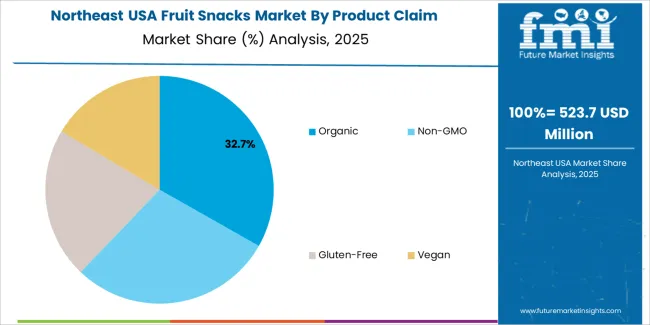
The Northeast shows steady demand for fruit snacks with a CAGR of 6.5%. The region’s large, urban population, particularly in cities like New York, Boston, and Philadelphia, is increasingly adopting healthier lifestyles, driving the demand for nutritious, convenient snacks. As consumers in the Northeast look for snacks that align with their health-conscious values, fruit snacks, with their natural ingredients and convenience, are an attractive option.
The steady growth in this region is also supported by the rise in awareness about the importance of incorporating fruits into daily diets and the increasing availability of fruit-based snack options across retail outlets and supermarkets. However, the growth rate in the Northeast is slightly lower than in the West and South, likely due to higher competition from other snack categories and differing regional preferences. Despite this, the Northeast continues to see a consistent demand for fruit snacks.
The Midwest shows moderate growth in the demand for fruit snacks with a CAGR of 5.6%. While the region has a strong retail presence, the demand for fruit snacks is somewhat slower compared to more health-conscious areas like the West and South. However, the growing awareness of healthy eating, along with the increasing availability of fruit snacks in supermarkets and convenience stores, is contributing to steady market growth.
The demand in the Midwest is also supported by a rise in the popularity of natural foods, especially among younger consumers and families seeking healthier snack alternatives. As regional awareness about the benefits of fruit snacks increases and more brands cater to local preferences, demand is expected to grow at a moderate pace. However, the adoption rate in the Midwest is tempered by more traditional snack choices and lower emphasis on health trends compared to other regions.
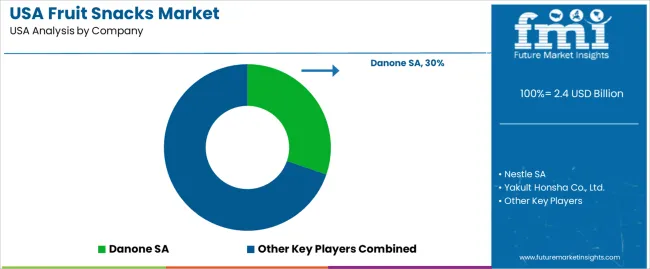
The demand for fruit snacks in the United States is rising, driven by consumer trends toward healthier, convenient, and portable snack options. Companies like Danone SA (holding approximately 30.3% market share), Nestlé SA, Yakult Honsha Co., Ltd., ADM, and Kerry Group are key players in this industry. As consumers seek alternatives to traditional sugary snacks, fruit-based snacks made with natural ingredients, minimal processing, and added nutritional benefits are becoming increasingly popular. These products, ranging from dried fruit to fruit bars and gummies, cater to the growing interest in healthier snack options for both children and adults.
Competition in the fruit snacks industry is primarily driven by product innovation, nutritional content, and sustainability. Companies are focusing on enhancing the health appeal of fruit snacks by offering products with no added sugar, high fiber, and added vitamins. Another key area of competition is the use of organic and sustainably sourced ingredients to appeal to environmentally conscious consumers. There is also an emphasis on convenience and portability, with companies offering snacks in single-serving sizes that are easy to carry and consume on-the-go. Marketing materials typically highlight product attributes such as natural ingredients, health benefits, taste, and packaging that supports sustainability. By aligning their products with the growing demand for healthy, eco-friendly, and convenient snack options, these companies aim to strengthen their position in the USA fruit snacks industry.
| Items | Details |
|---|---|
| Quantitative Units | USD Billion |
| Regions Covered | USA |
| Product Type | Dried Fruits, Fruit Chips, Freeze-Dried Fruits, Fruit Leathers or Rolls, Fruit-Based Snack Bars |
| Packaging Type | Single-Serve Packs, Multi-Serve Packs, Bulk Packaging, Resealable Pouches, Cups and Trays |
| Product Claim | Organic, Non-GMO, Gluten-Free, Vegan |
| End Use Application | Retail/Household Consumption, Foodservice/HoReCa, Industrial Use |
| Sales Channel | Store-based Retail, Online Retail |
| Key Companies Profiled | Danone SA, Nestle SA, Yakult Honsha Co., Ltd., ADM, Kerry Group |
| Additional Attributes | The market analysis includes dollar sales by product type, packaging type, product claim, and end-use application categories. It also covers regional demand trends in the USA, particularly driven by the growing demand for healthy, convenient fruit snacks across different consumer segments. The competitive landscape highlights key manufacturers focusing on innovations in organic, non-GMO, and gluten-free snacks. Trends in the increasing adoption of online retail and eco-friendly packaging are explored, along with advancements in product formulation and sustainability initiatives. |
The global demand for fruit snacks in USA is estimated to be valued at USD 2.4 billion in 2025.
The market size for the demand for fruit snacks in USA is projected to reach USD 4.7 billion by 2035.
The demand for fruit snacks in USA is expected to grow at a 7.0% CAGR between 2025 and 2035.
The key product types in demand for fruit snacks in USA are dried fruits, fruit chips, freeze-dried fruits, fruit leathers or rolls and fruit-based snack bars.
In terms of product claim, organic segment to command 34.2% share in the demand for fruit snacks in USA in 2025.






Our Research Products

The "Full Research Suite" delivers actionable market intel, deep dives on markets or technologies, so clients act faster, cut risk, and unlock growth.

The Leaderboard benchmarks and ranks top vendors, classifying them as Established Leaders, Leading Challengers, or Disruptors & Challengers.

Locates where complements amplify value and substitutes erode it, forecasting net impact by horizon

We deliver granular, decision-grade intel: market sizing, 5-year forecasts, pricing, adoption, usage, revenue, and operational KPIs—plus competitor tracking, regulation, and value chains—across 60 countries broadly.

Spot the shifts before they hit your P&L. We track inflection points, adoption curves, pricing moves, and ecosystem plays to show where demand is heading, why it is changing, and what to do next across high-growth markets and disruptive tech

Real-time reads of user behavior. We track shifting priorities, perceptions of today’s and next-gen services, and provider experience, then pace how fast tech moves from trial to adoption, blending buyer, consumer, and channel inputs with social signals (#WhySwitch, #UX).

Partner with our analyst team to build a custom report designed around your business priorities. From analysing market trends to assessing competitors or crafting bespoke datasets, we tailor insights to your needs.
Supplier Intelligence
Discovery & Profiling
Capacity & Footprint
Performance & Risk
Compliance & Governance
Commercial Readiness
Who Supplies Whom
Scorecards & Shortlists
Playbooks & Docs
Category Intelligence
Definition & Scope
Demand & Use Cases
Cost Drivers
Market Structure
Supply Chain Map
Trade & Policy
Operating Norms
Deliverables
Buyer Intelligence
Account Basics
Spend & Scope
Procurement Model
Vendor Requirements
Terms & Policies
Entry Strategy
Pain Points & Triggers
Outputs
Pricing Analysis
Benchmarks
Trends
Should-Cost
Indexation
Landed Cost
Commercial Terms
Deliverables
Brand Analysis
Positioning & Value Prop
Share & Presence
Customer Evidence
Go-to-Market
Digital & Reputation
Compliance & Trust
KPIs & Gaps
Outputs
Full Research Suite comprises of:
Market outlook & trends analysis
Interviews & case studies
Strategic recommendations
Vendor profiles & capabilities analysis
5-year forecasts
8 regions and 60+ country-level data splits
Market segment data splits
12 months of continuous data updates
DELIVERED AS:
PDF EXCEL ONLINE
Competitive Breakdown of Fruit Snacks Suppliers
Fruit Snacks Market Analysis by Product Type, Nature, Flavour Type, Distribution Channel Type, and Processing Type Through 2035
USA Freeze Dried Fruits Market Growth – Innovations, Trends & Forecast 2025–2035
Australia Fruit Snacks Market Insights – Trends, Demand & Growth 2025-2035
Demand for Fruit Snacks in Japan Size and Share Forecast Outlook 2025 to 2035
Demand for Fruit Pectin in USA Size and Share Forecast Outlook 2025 to 2035
Demand for Protein Snacks in USA Size and Share Forecast Outlook 2025 to 2035
Demand for Pet Snacks and Treats in USA Size and Share Forecast Outlook 2025 to 2035
Fruit Punnet Market Forecast and Outlook 2025 to 2035
USA Medical Coding Market Size and Share Forecast Outlook 2025 to 2035
USA Labels Market Size and Share Forecast Outlook 2025 to 2035
Fruit And Vegetable Juice Market Size and Share Forecast Outlook 2025 to 2035
USA Plant-based Creamers Market Size and Share Forecast Outlook 2025 to 2035
USA Barrier Coated Paper Market Size and Share Forecast Outlook 2025 to 2035
USA Electronic Health Records (EHR) Market Size and Share Forecast Outlook 2025 to 2035
USA Animal Model Market Size and Share Forecast Outlook 2025 to 2035
USA and Canada Packer Bottle Market Size and Share Forecast Outlook 2025 to 2035
USA Stretch Hood Films Market Size and Share Forecast Outlook 2025 to 2035
Fruit and Vegetable Ingredient Market Size and Share Forecast Outlook 2025 to 2035
Fruit Pomace Market Size and Share Forecast Outlook 2025 to 2035

Thank you!
You will receive an email from our Business Development Manager. Please be sure to check your SPAM/JUNK folder too.
Chat With
MaRIA